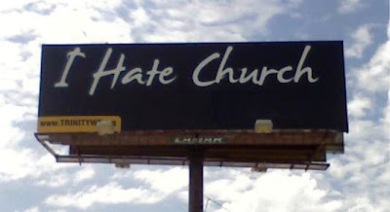The book is divided into 3 parts: way, practices, and ancient. I tried to read a chapter from each in my review/scan. In "Practicing the Way of Jesus," he touches on what so many of those to which I flock understand. Literally, it is written, "whenever I hear the name Jesus, I cringe." Like the "I hate church" billboard, it's a statement that makes me want to read more.

The divide between the different "branches" of Christians is interesting. I'm not talking denominations. I can kick it with Episcopals, Methodists, & Disciples alike. It's those darn conservative, Bible thumping, "I've got all the answers" variety that leave the taste of vomit in my mouth. And mine in theirs, to be fair.
A line from the book that I like: "I am convinced that Jesus didn't come to start a new religion; he came to proclaim a new kingdom." Kingdom. Lifestyle. Not this malarkey of my side, your side, my way, your way, my people, your people. The Kingdom. One Love. A new kingdom. Not the way of old, convenience, tradition, & just because. Maybe I should start telling people I'm down with the new kingdom instead of telling them I'm a Christian; I wonder what kind of crazy they'd think I am. lol.

Under practices, I opted to read the chapter on contemplative practices. Some that appealed to me are:
- Spiritual Reading & Study (long been hard for me to practice with regularity but oh how I believe in it & its importance)
- Practicing God's Presence: Learning to be aware of God as constant companion, staying in constant contact with God, living with one's spiritual windows and doors open to God (I call this a good day)
- Contemplative Prayer: Practicing a kind of prayer that culminates in silent attentiveness to God, a prayer that is about listening and receiving rather than speaking & expressing (admittely, I don't usually want to hear what God is ready to say.)
- Holy Days & Seasons: Observing special days and seasons that interupt the normalcy and regularity of daily life with intensity. These special days or seasons stimulate the remembering of special events or meanings and provide members of a faith community with a special encouragement to engage in specified practices.
- Meditation & Memorization: Holding a truth in the mind through nonanxious concentration so that it can be savored and rooted deeply and accessible to memory in the stress and struggle of daily life
The glimmers of light, joy, & peace I got when skimming the book are the reasons I will present it as a possibility when the time comes. The notable drawback was obvious in chapter 1 when the author references writing like 3 other books to actually talk about the ancient practices. At that point, I was afraid he wasn't actually going to talk about the practices in the sense of "how to". It is true he doesn't go in depth but I got glimmers of more life and that's a start. Namaste & Blessed be.



